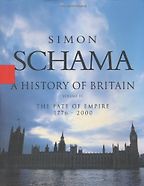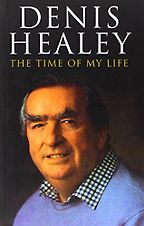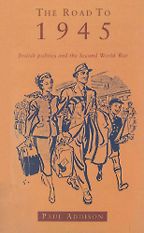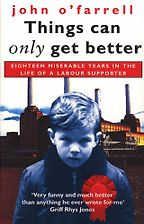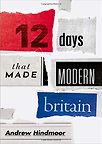You’ve just written an excellent book: 12 Days that Made Modern Britain, which spans 40 years of British history. It’s a really clever way of charting how the UK has changed and why and a really good read. Before we get to the books, what did you find were the main features of this period of British history?
The standard line in academia is that the key difference is economics, around the rise of what comes to be called ‘neoliberalism’ and the growth of markets. There are parts of the book where I talk about that and the changes in the economic landscape.
But for me, growing up in Sheffield and then living abroad for a decade, the single standout coming back is that the country feels a lot more socially liberal than it did when I was young. That strikes me as a pretty positive change that we don’t spend enough time celebrating.
That doesn’t mean that everything’s perfect; it doesn’t mean that there aren’t political issues still to argue about, but it’s a real generational change. The degree of difference in embedded norms of liberalism, tolerance and diversity between my children, myself, and my parents is enormous. We take it for granted and forget how important it is as a story of how much Britain has changed.
In your book, is it the chapter on the murder of an innocent black teenager, Stephen Lawrence, and the police’s terrible handling of that crime, as well as the chapter on gay marriage, that really explore those social changes?
That’s right. My favourite footnote—not that I normally tell people to go to the footnotes—is one on civil partnerships and the polling data showing that a majority of UKIP members are actually in favour of gay marriage. Given the demographic we expect UKIP members to be coming from, that is a really useful measure of just how far and how quickly the country has changed.
Do I detect a sense that, despite the move towards American-style economic neoliberalism since Margaret Thatcher, you don’t think that’s happened quite as much as people seem to believe?
This is an argument I’ve been having both in my head and with colleagues for a while. The book I wrote before this book is called What’s Left Now: the History and Future of Social Democracy. In it I mounted a heroic argument—particularly heroic given the state of British politics over the last few years—that we exaggerate the degree to which Britain has been transformed from a social democracy into a neoliberal dystopia.
“We exaggerate the degree to which Britain has been transformed from a social democracy into a neoliberal dystopia”
Britain recognizably retains a social democratic heart to its politics and to its economy, but there’s a trait of miserablism on the left which sees everything as having gone to hell in a handcart, all politicians as equally bad, every government as bad as the one that preceded it—and just locks itself into a really negative outlook.
Partly on those social liberalism grounds, and partly on some arguments about redistribution, I have tried to persuade myself, approaching my 50th year, to be a little bit more optimistic—though as my family says it’s somewhat ironic, given my personal tendency look on the worst side of everything, to be offering an upbeat political manifesto.
Many problems in Britain are blamed on austerity but, in your book, you point out that a different picture emerges if you look at the figures. Talk me through your views on this controversial topic.
I just think both sides are wrong about austerity. There have been cuts—and those cuts have been bad, and in many ways are biting now far more than they were a few years ago—but it’s possible to exaggerate the degree to which public expenditure has been savaged. Overall, what we’ve seen is the end to public spending increases and, give or take, public expenditure being held constant, with cuts in some areas. That’s not a pretty picture, and it’s certainly not a policy that I personally would have supported, but it’s far from being a 1930s-style slash and burn, as the left would have it.
The right, meanwhile, argue that we had to have this period of austerity; that the medicine was tough, but it’s been worth it. That’s also nonsense. The public debt now is way higher than it was in 2010, and the effect austerity has had in terms of lower growth means that the country is much poorer than it would have been.
So the debate we’ve had about austerity—which we now seem to have stopped having because we’ve all agreed it’s over—has just left me wanting to pull my hair out. The policy itself was wrong and the public understanding of what was happening was polemically divided between left and right in a way that just wasn’t helpful.
Let’s turn to the books you’ve chosen on modern British history. First on the list are the two books on Brexit by Sunday Times journalist Tim Shipman: All Out War and Fallout. These have been shortlisted for a number of prizes and are generally acknowledged to be brilliant. Tell me how they fit into an understanding of modern British history.
On the train here, I was thinking about what makes a great history book–and a modern history book in particular—and I think there are three things: first is if it can take you behind the scenes and tell you what people were really thinking and saying to each other at the time. That by reading the book, we learn things that we otherwise might only get a hint of.
The second important quality for a good modern history book is that it gives you the bigger picture. We get bombarded day after day with news, and it just becomes overwhelming if you’re trying to make sense of the history and really understand events. A good history book is one that takes you out of the hurly-burly of the day-to-day and shows you how things fit together.
“Modern history is inevitably an exercise in nostalgia”
Third and finally, I think modern history is inevitably an exercise in nostalgia. It reminds you of your own past. It pushes you to remember where you were and what you were thinking when something happened. The books I’ve chosen offer examples of all three of these aspects in different ways.
Starting with the books by Tim Shipman, All Out War and Fallout: these are consummate insider accounts of the politics of the last few years. These are events we’re still living through, and the third book in the trilogy will be out later this year.
Both are really substantive books that I give to my students. They’re very long and very detailed, not lightweight books by any means. He’s got this amazing capacity to marshal the minutiae of what’s going on, but also make his account rich in its personalities and its anecdotes.
The level of access he’s been able to get is breathtaking. You get a sense of really being told what people were arguing and thinking and saying to each other. For me, it’s the level of insider access that makes these books stand apart and it’s what journalists like Shipman can give you.
Though I’m very interested in Brexit, when I first picked up these books, I was a bit worried that I wasn’t quite interested enough to hear a blow-by-blow account. But I started listening to Fallout as an audiobook and I got hooked. Some of the things these politicians say about each other, the turns of phrase, are just hilarious. I was completely gripped.
It is a page-turner. It’s quite interesting to see politicians being so deliciously and cleverly rude about each other and to each other. Clearly he’s dealing with massively important affairs of state, but the characters are just so human, the way they’re portrayed. I just find it beautiful to read.
I also learned a lot: I finally understood, for example, the options available for the UK’s relationship with the EU. Shipman explains the difference between the Norway option, and the Switzerland arrangement, and how it was that Theresa May ended up not going for either of those.
They’re big books—goodness knows how long the audiobook must be—but coming to the end, you can kid yourself that you’re actually an expert. The books really do lay out all of the options. It’s this wonderful mixture of the knife-in-the-back, day-to-day human politics without losing sight of the big picture of why this matters and why people care about it.
Is it unusual to have that depth of insider information about what’s going on at a leadership level?
The classic example is Bob Woodward in America. Watergate set him up for a career where he had a high degree of access to George W Bush. He wrote some really great insider accounts of the Iraq War and then, more recently, about Obama and now Trump.
In Britain, for the Labour government you had Andrew Rawnsley. He was the chief political correspondent of the Observer and he wrote a book, Servants of the People (and also a second book, The End of the Party) where he was trusted as an insider by all of the key people and was clearly living and breathing it on a day-to-day basis. That’s the other book that stands out.
So it’s relatively unusual but not impossible, and Shipman is as good as any.
Your next book is by the historian Simon Schama, A History of Britain. It’s in three volumes and covers the entire history of Britain from 3000 BC to 2000 AD, so quite a long period.
I studied British history as a student and didn’t particularly enjoy it. When I came back from living in Australia, I decided I wanted to learn a bit more about the history I’d ignored when I was sitting in the classroom.
Simon Schama is a TV personality and academics are always bitchily suspicious of any historian who’s good at being on TV and being a celebrity. They will always want to assume that the histories they write are lightweight and insubstantial.
“Academics are always bitchily suspicious of any historian who’s good at being on TV and being a celebrity”
I read the three volumes of Schama’s A History of Britain quickly, because what they have in common with Shipman is that they are beautifully written. There’s a rhythm to them. Schama has mastered that real art of history where you give somebody reading it enough of a sense of detail that they feel the historian knows what they’re doing and that you come out of it knowing more, but without getting bogged down in the detail that you don’t need. Like Shipman, it’s a page-turner, though obviously on a really different scale of history. He manages to capture, at different points of the book, a real sense of what’s distinctive about British history.
It’s also a modern take. For example, I looked up his account of the events of 1688, when James II was ousted as monarch and replaced by William of Orange and Mary. This is sometimes called ‘the Glorious Revolution’—and actually comes up in your book because Maggie Thatcher proudly refers to it at one point—but Schama points out it was actually a Dutch invasion. Schama’s is a more modern interpretation of what 1688 was all about.
Yes, and he does that without ever being the trendy, right-on vicar. There’s a lightness to his touch as he punctures the myths of British history. He’s telling a story without being too snide about it all.
Having this whole sweep of history is so important. I studied British history in school and then at university, and the Tudors came up again and again. It would have been nice to be aware of what was going on over 5,000 years rather than just, you know, studying the reign of Henry VIII.
Yes, and the Schama books are very readable. There are books I read at work and there are books I read in the evening. The Schama ones I could read quite happily in the evening without it feeling like work.
A History of Britain goes right up to the modern period. It’s a different way of ending the book, because he offers very detailed portraits of Winston Churchill and George Orwell as two really important figures of 20th century British history. He describes them and their achievements at real length, but somehow whilst doing it seems to find a way of drawing together with it hundreds and hundreds of years of history.
It’s a neat ending, because historians otherwise have the problem of where do you end? How do you stop the book becoming out of date? The way he ends with Churchill and Orwell wraps the book up really neatly.
Let’s move on to book number 3 on your choice of British history books, which is Denis Healey’s autobiography The Time of My Life. This is very readable and I think was a bestseller when it was published in 1989?
That’s right. Denis Healey is such an interesting person and he tells such nice anecdotes in the book. He’s not exactly a lost politician now, but I suspect if you talk to the 18-year olds that I’m teaching, a lot of them wouldn’t even have heard of him. But Denis Healey was a really important figure from 1945 right through to the mid-1980s. He held a succession of major cabinet ministries, and was right at the centre of lots of the key economic and political debates at the time.
The Time of My Life is another book where you’re getting an insider’s account. You’re going behind the stage and seeing what he really thought about things at the time. Obviously, he’s writing with axes to grind—but that actually makes it more entertaining, because he’s got some pretty delicious pen portraits of people he’s argued with over the years. He also has some good observations, looking back at things with the benefit of hindsight, which it’s always good to see politicians doing.
Is there a particular anecdote that sticks with you from The Time of My Life?
There are probably two. A personal one is about when he was offered the Chair in International Politics at University College of Wales, Aberystwyth. He tells a story about going up there on the train from London and realizing how far, even in a small country the United Kingdom, Aberystwyth is from anywhere. By the time he arrived on the train, he decided that no matter what else happened, he was going to turn down the job.
I did my undergraduate degree at Aberystwyth and never had money for the train. I’d always be trying to hitchhike on a Friday afternoon to go to visit friends—including my now wife—in London. I was the world’s worst person to pick up, with long student hair and a dangly earring. I have these memories of getting stuck in the middle of nowhere in the Welsh countryside.
Five Books interviews are expensive to produce. If you're enjoying this interview, please support us by donating a small amount.
The other part of The Time of My Life that stands out for me—and I pick up on it in 12 Days that Made Modern Britain—is some of the stories around the 1976 economic crisis and the IMF bailout. His right take is that much of that crisis was driven by bad figures prepared by the Treasury. Those figures were revised a year later and shrank the size of the public deficit problem. The whole country went through this profound economic and political crisis—which, you can argue (and I do in my book), was a key a key turning point for Britain.
History might have turned anyway, but Healey talks with utter contempt about those in the Treasury who just got the numbers wrong. At one point, he even goes so far as to wonder aloud whether their political inclinations had led them to give him figures that weren’t accurate.
We argue all the time in politics and economics about numbers, and treat them as sacrosanct. But invariably, they are just best guesses.
It also covers a long period of history. Healey writes at the beginning of the book, “At one time I wanted to call this memoir A Hitchhiker’s Guide to the Modern World. My generation has seen it all.”
Yes, and starting with the Second World War, which we’ll come to in a minute. He was part of a generation of politicians (that we’ve now come to the end of) who were absolutely defining in British politics.
We’ve lost that generation now, and that’s just the passage of time, but I do think it’s worth remembering, when we look back on history at its impact. These were people whose early political memories were of the war, for whom it was a decisive factor in their outlook. World War Two was a defining moment in setting the post-war consensus.
Do you think there would be fewer Eurosceptics today, if there were more politicians who’d been alive during World War Two?
For someone like Edward Heath, the experience of fighting for and with Europe was absolutely seminal and underpinned why Europe was so important to him. He was probably the only truly pro-European Conservative leader.
But I would say there’s no denying the war also gave rise to a strain of arrogant nationalism—often on the left and sometimes on the right—that you can see feeding into Brexit: ‘We won the war. We intervened to stop other countries fighting each other. They need to integrate, because the problem was theirs, and we don’t and didn’t because we emerged triumphant.’ That was a dominant strain of thinking in early attitudes towards the European Union. It was someone else’s problem to sort out. The consequence of that is that we came into Europe very late and with our tails already between our legs because our vision of being a superpower had been so discredited.
Let’s talk about The Road to 1945 next, which is by Paul Addison.
I read The Road to 1945 a long time ago. It’s an example of a history book that’s not about insider access, although he does a really thorough historian’s job looking through the archives and finding out things we didn’t know. Rather, what’s impressive about the book is its sweep and how it fits things together that aren’t obvious.
What The Road to 1945 shows is the degree to which the triumphant—because it’s usually viewed as triumphant—1945 Labour government was the product of the war. Clement Attlee government is feted for the creation of the post-war consensus, of the welfare state, of the NHS, of Keynesian economic management. But in a sense that wasn’t appreciated at the time and hasn’t always been appreciated since, as Paul Addison writes in the preface: “When Labour swept to victory in 1945 the new consensus fell like a branch of ripe plums into the lap of Mr Attlee.”
The pursuit of total war required an unbelievable mobilization of resources and planning. Churchill decided it required a coalition with Labour and the trade unions and they were given a significant say in government. There was also a feeling that in order to maintain public support for the war during some dark times, there would have to be a positive vision on offer for what would follow in peacetime.
Get the weekly Five Books newsletter
The war changed everything and made the shift to the left in British politics the consensus from 1945. It was just there and waiting when Labour was elected. That was a massive shock at the time, expected by no one, but it was a sign of how much thinking within Whitehall had already changed. What would have once seemed utterly unthinkable had become, by 1945, the norm.
For me as a modern historian, what’s interesting is the contrast with the economic crisis of 2008-2009. There’s a debate about whether we have learned lessons from the crisis and whether the world has changed. On the whole, it probably hasn’t. I’m not saying it’s the same scale of shock, because it isn’t, but you’ve got a neat contrast there with The Road to 1945, and how the war did change everything and everyone’s thinking.
For those not familiar with British history, the great wartime leader, Winston Churchill, was booted out in an election in 1945, less than two months after the Allies won the war. There was a landslide victory which brought the opposition party, Labour, to power. But if I’m right, Churchill later came back again?
There are two parts to the story. The Labour party to this day—and Jeremy Corbyn is a bit of a sucker for this one—tell the glorious story of 1945. It was a hugely important government. But it fell into utter exhaustion. The drive for exports, which that government deliberately used to push down home consumption, meant rationing was still a commonplace in the late 1940s. Some goods were more rationed in1949 than they had been during the war! People tired of that Labour government.
Churchill and the Conservatives then came back into power in the 1950 election. But what’s important through the 1950s is the degree to which the Conservatives explicitly accepted the basic terms of Labour’s legacy from 1945. It didn’t mean they agreed with everything—there were big arguments around nationalization and around the role of trade unions—but the Conservative manifesto of 1945 looked very different from the Conservative manifesto of 1950 and 1955. So Churchill and the Conservatives come back, but only by accepting how much had changed.
Last on your list of British history books is a comedy biography, Things Can Only Get Better by John O’Farrell. The subtitle is ‘Eighteen Miserable Years in the Life of a Labour Supporter.’
For me, this book is in the ‘history as nostalgia’ category, a book that reminds you of the past and of who you were in the past. It’s a genuinely funny book. It will resonate for anybody who was (as I was) a left-of-centre student feeling absolutely righteous conviction at the certainty of the correctness of their own views. Utter bemusement is the prerogative of youth, and it was impossible to understand how anyone could vote for a Conservative government.
“At the moment, there’s a real pessimism about what’s happening in this country. There’s nothing new about that—it was there throughout the Thatcher years.”
And yet, no matter how absolutely and obviously right I and other long-haired students were, nothing ever quite turned out the way that we wanted it to, and this was just part of being on the left. Politics was an all-encompassing pursuit in which no matter what else happened, the Conservatives always won.
At the moment, there’s a real pessimism about what’s happening in this country. There’s nothing new about that—it was there throughout the Thatcher years.
Things Can Only Get Better does a really good job of reminding us what it was like during that time. The book it most reminds me of is by Nick Hornby, who wrote Fever Pitch at about the same time, an account of what it was like to be a lifelong Arsenal fan. This book is its politics equivalent, about what it was like to be a true believer in a cause—and all of the highs and very frequent lows that came with that.
He writes about Margaret Thatcher, “like the bubonic plague and stone cladding, no one took her seriously until it was too late.” It’s easy to forget now that her rise wasn’t inevitable. As you trace in your book, it was not at all easy for her to become prime minister.
For the left, this is a history that starts from, ‘Who is this person? What is happening? It’ll be okay because she’ll lose.’ But she wins. Then, you think she’ll lose in 1983, but it’s all about the Falklands and she wins. Then, the Conservatives win again in 1987. And again in 1992. There will be generation of people in their early 50s for whom the first 10-15 years of their interest in politics would have all been about Margaret Thatcher. And if you were on the left, that would have felt like the most miserable time imaginable.
“Anti-Thatcherism—being on the left, supporting the miners—was a whole identity. It wasn’t just what you thought about politics, it was who you were.”
Interestingly, for the Conservative side, because she’s venerated to such a degree, they’ve got the problem that everything that’s come after her has, in some sense, been a disappointment and a failure. Everything is compared back to Thatcher and the glory days. So you’ve got this split generation for whom the blessed Margaret is the reference point for everybody, for both parties. They just each draw different lessons from it.
The other important thing to mention about John O’Farrell’s book is his ability to capture the degree to which politics was about day-to-day identity: who you dated, what you wore, what music you listened to. That now feels really dated, but when you read the book, you go back and it reminds you of how this anti-Thatcherism—being on the left, supporting the miners—was a whole identity. It wasn’t just what you thought about politics, it was who you were.
This is something Nick Clegg, the former leader of our tiny centrist party, the Liberal Democrats, writes about in his book: how difficult it is to counter the tribalism in British politics. But that’s changing now, and Brexit is shaking things up even more, is that right?
British politics was so stable for such a long time, that if you knew what somebody’s job was and how their parents had voted, you would have had a 9 out of 10 chance of guessing how they would vote in an election. Also—and this is a ballpark figure—around 9 out of 10 people did not change their vote in any election. So you had this utter sense of stability, with elections being decided in marginal constituencies by the relatively small numbers of people who changed their mind.
Five Books interviews are expensive to produce. If you're enjoying this interview, please support us by donating a small amount.
What would you look at now, if you could know one thing to figure out how somebody voted? Their age? Possibly. Are they public sector or private sector? That would matter. But it’s so much more fluid and cross-cutting. Brexit adds another layer on top of that. The volatility of the electorate means you can be wiped out in one election and then emerge absolutely triumphant in another. Sitting her now, it’s possible to see both a scenario in a general election where Boris Johnson is returned with a majority of 200 and a scenario where he crashes and burns and goes down as the greatest disaster of a Conservative prime minister in history. There’s just this volatility there, now, in the country: how people distrust politicians, the way in which the tension goes from one issue to another, the way there are now multiple parties. The instability feels built-in.
And is that a good thing?
It’s a bugger if you’re teaching modern history because you can’t write your lectures in advance and hope that they’re still going to stand up in two weeks’ time. When I was writing 12 Days that Made Modern Britain I kept putting off to the last possible moment sending the Brexit stuff to the publishers because I knew the moment I sent it something would happen that next day. We live in interesting times and all that. I’m not sure I’m particularly happy with what’s happening, but I suppose if you’re interested in British politics and modern history it’s good for business.
Five Books aims to keep its book recommendations and interviews up to date. If you are the interviewee and would like to update your choice of books (or even just what you say about them) please email us at [email protected]

